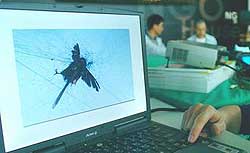Freeing captured birds criticized
By Chiu Yu-Tzu, TAIPEI TIMES STAFF REPORTER, Nov 03, 2004
CRUEL PRACTICE: The custom of setting birds free to improve one's karma is well-intended. But it has led to the rise of a brutal and inhumane birdcatching business
Taoist and Buddhist groups have long set birds and other animals free in the belief that it will garner good karma. But in Taiwan, the practice has become so commercialized that it leads to the unnecessary suffering and death of about 600,000 birds each year, animal rights activists said yesterday.
In the last two years, volunteers and activists from both the Environment and Animal Society of Taiwan and the Kaohsiung Teachers Association's Ecological Education Center have visited 155 shops selling birds in the Taipei, Taichung, and Kaohsiung areas. They found that 60 percent them sold captured birds to religious groups, who convince their followers that they can eliminate their bad karma by taking part in freeing the birds.
At a press conference held yesterday in Taipei, a documentary showing the brutal capture of such birds and their delivery to shops was shown to the media.
Wild birds were captured by nets set up in fields. Some birds were fried in the sun or starved to death because the birdcatchers did not check their nets frequently.
 A display at a press conference held to condemn the custom of freeing birds to improve one's karma, which activists say injures or kills at least 600,000 birds every year. The press conference was held by The Environment and Animal Society of Taiwan and the Kaohsiung Teachers Association's Ecological Education Center.
A display at a press conference held to condemn the custom of freeing birds to improve one's karma, which activists say injures or kills at least 600,000 birds every year. The press conference was held by The Environment and Animal Society of Taiwan and the Kaohsiung Teachers Association's Ecological Education Center.
PHOTO: GEORGE TSORNG, TAIPEI TIMES
The documentary also showed birds being lured by bait covered with a huge net. Birds struggled after getting stuck, and some died in the net. Those who survive must endure long-distance transportation to places where they're sold. The film showed birds being packed like sardines into regular boxes and shipped by train to customers, who are usually temple leaders.
Activists said that the types of captured birds vary. They have found shops selling turtledoves, Chinese bulbuls, scaly-breasted munias, Japanese white-eyes, sparrows, manikins, and pigeons at prices between NT$10 and NT$300 each.
More expensive birds such as skylark and imported large parrot, are available for NT$1,000 to NT$6,000. And even some protected species, such as Mikado pheasants, Hwamei and lovebirds are sold, at still higher prices.
Activists estimate that only 10 percent of captured birds are actually lucky enough to be freed by religious followers, who usually donate money to event organizers. Nationwide, about 500 religious groups hold such activities.
"We don't blame blind followers, but instead some crafty religious leaders," EAST president Wu Hung (??) said. "Followers are not aware that their religious bird-freeing is part of a commercialized activity that involves bird-catching and selling."
Wu Hung said disregarding the birds' lives showed no sympathy for animals, and that such activities jeopardize the nation's ecological balance. There is also a potential health risk.
"Mixing diverse bird types during transportation increases the risk of epidemics such as bird flu," Wu Hung said.
Bird conservationists said that wild birds, once captured, are much more likely to die then pet birds because wild birds are easily scared and often refuse to be fed.
Meanwhile, the Legislative Yuan yesterday passed the first reading of a proposal to revise Article 10 of the Animal Protection Law (?????) that would add a prohibition on freeing captured animals.
"The relationship between demand and supply has been commercially established by dishonest animal catchers, dealers and purchasers," Democratic Progressive Party Legislator Lu Po-chi (???), who initiated the proposal, said yesterday.
Lu said he would soon work with other legislators to have the revision passed in order to prevent the practise, which though benign in intent has spawned a cruel business.

 A display at a press conference held to condemn the custom of freeing birds to improve one's karma, which activists say injures or kills at least 600,000 birds every year. The press conference was held by The Environment and Animal Society of Taiwan and the Kaohsiung Teachers Association's Ecological Education Center.
A display at a press conference held to condemn the custom of freeing birds to improve one's karma, which activists say injures or kills at least 600,000 birds every year. The press conference was held by The Environment and Animal Society of Taiwan and the Kaohsiung Teachers Association's Ecological Education Center.